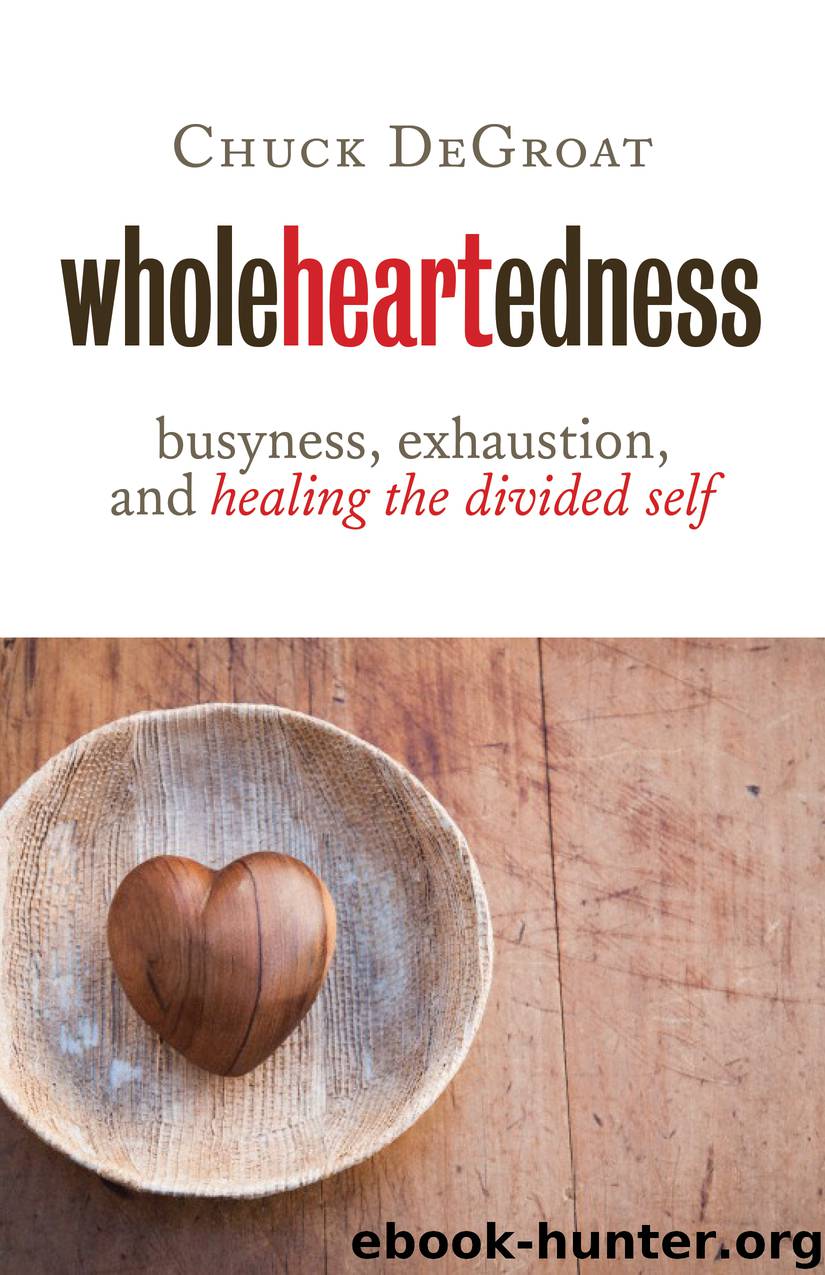Wholeheartedness by Chuck DeGroat

Author:Chuck DeGroat
Language: eng
Format: epub
Publisher: Wm. B. Eerdmans Publishing
Published: 2016-02-04T12:38:03+00:00
Chapter 6
understanding our whole story
In the press of busyness, there is neither time nor quiet to win the transparency that is indispensable if a man is to come to understand himself in willing one thing.
Søren Kierkegaard
Who am I? This or the other?
Am I one person today and tomorrow another?
Dietrich Bonhoeffer
God is more intimate to me than I am to myself.
St. Augustine
As a Christian, I’m convinced that every human being is an image-bearer of God. Our deepest DNA is God-DNA. The venerable St. Augustine put it bluntly: “God is more intimate to me than I am to myself.”1 And the fifteenth-century Augustinian mystic Catherine of Genoa echoes her teacher’s thought when she writes, “My Me is God, nor do I recognize any other Me except my God Himself.”2
Our deepest “me” is God. We’re one. We’re in union. And sometimes we experience this extraordinary oneness in a moment of communion, or as we’re swept into beauty, or connected in a way that feels transcendent.
But then we’re jolted back to reality. In a rush, we’re welcomed back into our ordinary experience of dividedness. We’re aware again of our inner contradictions and frustrated desires. We react out of our reptilian brain, hurting the people we love the most. But perhaps we retain a sense of heart-sickness, a longing which reminds us that division is not our final state.
The division we experience — which, of course, leads to exhaustion and relational turmoil and inner angst — cuts us off from the Deep Well which is God. Unable to draw water from the Life-Giving Fountain, we look near and far for something — anything — that can provide life. An addiction. A drug. A dopamine surge of glory. Cut off from the Inner Light, we look for something — anything — that will illumine the darkness we experience within.
It’s as if we’ve been cut off from the energy source, and thus cut off from our very selves. C. S. Lewis puts it this way:
And indeed the only way in which I can make real to myself what theology teaches about the heinousness of sin is to remember that every sin is the distortion of an energy breathed into us — an energy which, if not thus distorted, would have blossomed into one of those holy acts whereof “God did it” and “I did it” are both true descriptions.3
Lewis intuits the divide as a break in our fundamental oneness and wholeness in God, where our desire and God’s desire are the same.
Here’s an important point, and one we forget when we’re unreflectively going about our busy lives: Wholeness is our birthright. Oneness is our most original state of being.
And though our experience of division makes us feel as if we’re being pulled in a thousand different directions, we can always — always — return to our center. Though we may be fractured images of God, we’re nonetheless images, restored and matured as
Download
This site does not store any files on its server. We only index and link to content provided by other sites. Please contact the content providers to delete copyright contents if any and email us, we'll remove relevant links or contents immediately.
The 5 Love Languages: The Secret to Love That Lasts by Gary Chapman(9792)
The Space Between by Michelle L. Teichman(6932)
Assassin’s Fate by Robin Hobb(6200)
Wiseguy by Nicholas Pileggi(5770)
Everything Happens for a Reason by Kate Bowler(4734)
Gerald's Game by Stephen King(4642)
Pillow Thoughts by Courtney Peppernell(4272)
A Simplified Life by Emily Ley(4158)
The Power of Positive Thinking by Norman Vincent Peale(4062)
Harry Potter and the Prisoner of Azkaban (Book 3) by J. K. Rowling(3355)
Resisting Happiness by Matthew Kelly(3337)
Girl, Wash Your Face by Rachel Hollis(3282)
Being Aware of Being Aware by Rupert Spira(3272)
The Secret Power of Speaking God's Word by Joyce Meyer(3184)
The Code Book by Simon Singh(3181)
More Language of Letting Go: 366 New Daily Meditations by Melody Beattie(3024)
Real Sex by Lauren F. Winner(3016)
Name Book, The: Over 10,000 Names--Their Meanings, Origins, and Spiritual Significance by Astoria Dorothy(2980)
The Holy Spirit by Billy Graham(2944)
